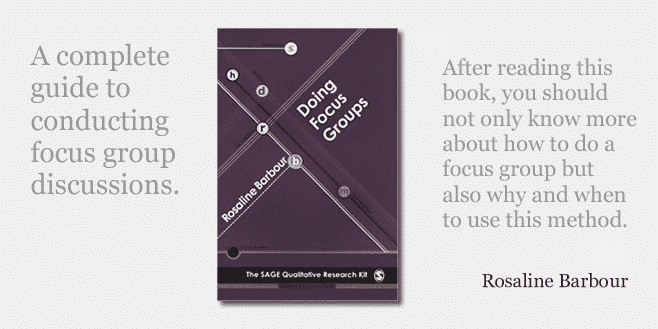Review Overview
Interesting content - 8
Easy to read - 8
Usefulness - 10
8.7
A comprehensive qualitative research guide on how, why and when to conduct focus group discussions.
I was recently involved in a frustrating debate with a World Bank development economist where qualitative research was dismissed as ‘not reliable and anecdotal’. Thankfully, this view now appears to be in the minority, as international NGOs and UN agencies are increasingly recognising and utilising qualitative research methods such as focus group discussions (or FGDs) in program design and evaluation.
The beauty of qualitative research is its ability to shed light on socio-cultural factors which otherwise are extremely hard to measure. The problem is that few development practitioners are actually trained in qualitative research techniques and so often researchers do not realise the full potential of extremely useful methods such as focus group discussions.
Part of the Sage Qualitative Research Series, ‘Doing Focus Groups’ by Rosaline Barbour provides an extremely useful guide covering how, when and why to conduct focus group discussions.
The author begins by contextualising focus group research, providing a thorough background of the epistemological underpinnings of focus group discussions as a qualitative research method. I know the word ‘epistemological’ may make some people squirm, but worry not, at just 150 pages, the book – aimed at researchers, university students and teachers – is a relatively easy read and does not require a social science background (although this may help).
By reflecting on real life experiences of conducting focus group discussions, the author highlights the merits of this method in collecting rich contextual data and helping us understand why people think the way they do. At the same time, the author explains the complexities involved in implementing focus group discussions successfully and warns against inappropriate expectations of the method.
From how to use purposive sampling to reflect diversity in the population to how to write notes to aid analysis, the book goes through the most important problems of using the method using real examples. Then at the end of each chapter key points are summarised and additional reading materials are recommended.
‘Doing Focus Groups’ is written by a UK-based practitioner, so it does have limitations for researchers in international development. Though some aspects of cross cultural research are touched upon, several challenges specific to conducting focus group discussions in non-English speaking, developing country contexts (such as translation) are not dealt with in depth. Nevertheless, the book does provide excellent general advice to moderators on how to facilitate focus groups, which is relevant in all settings.
Overall, ‘Doing Focus Groups’ provides excellent reading for qualitative researchers, helping us to realise the full potential of this qualitative research method. Likewise it is a must read for any quantitative researchers out there who doubt the power of qualitative research.



